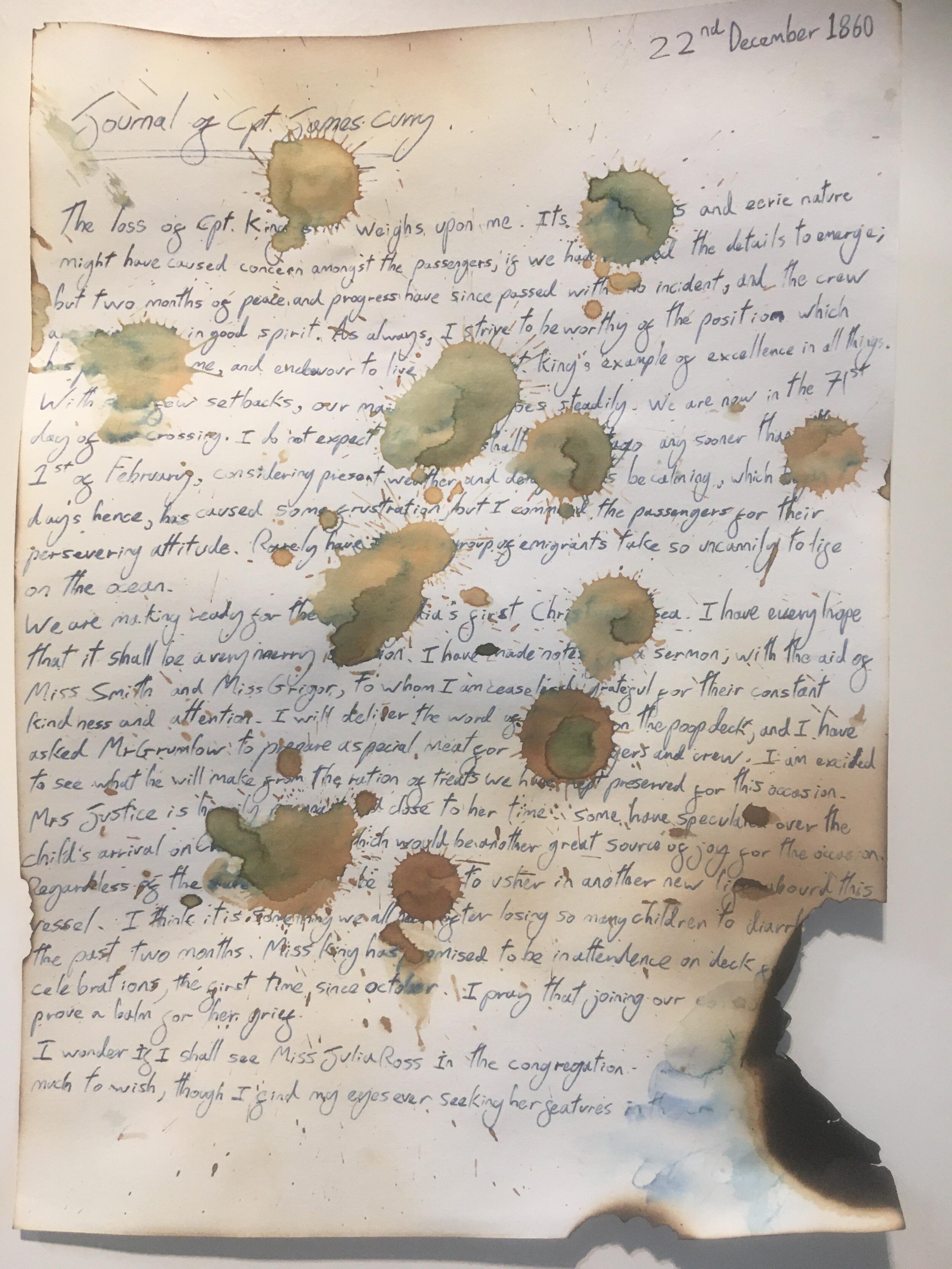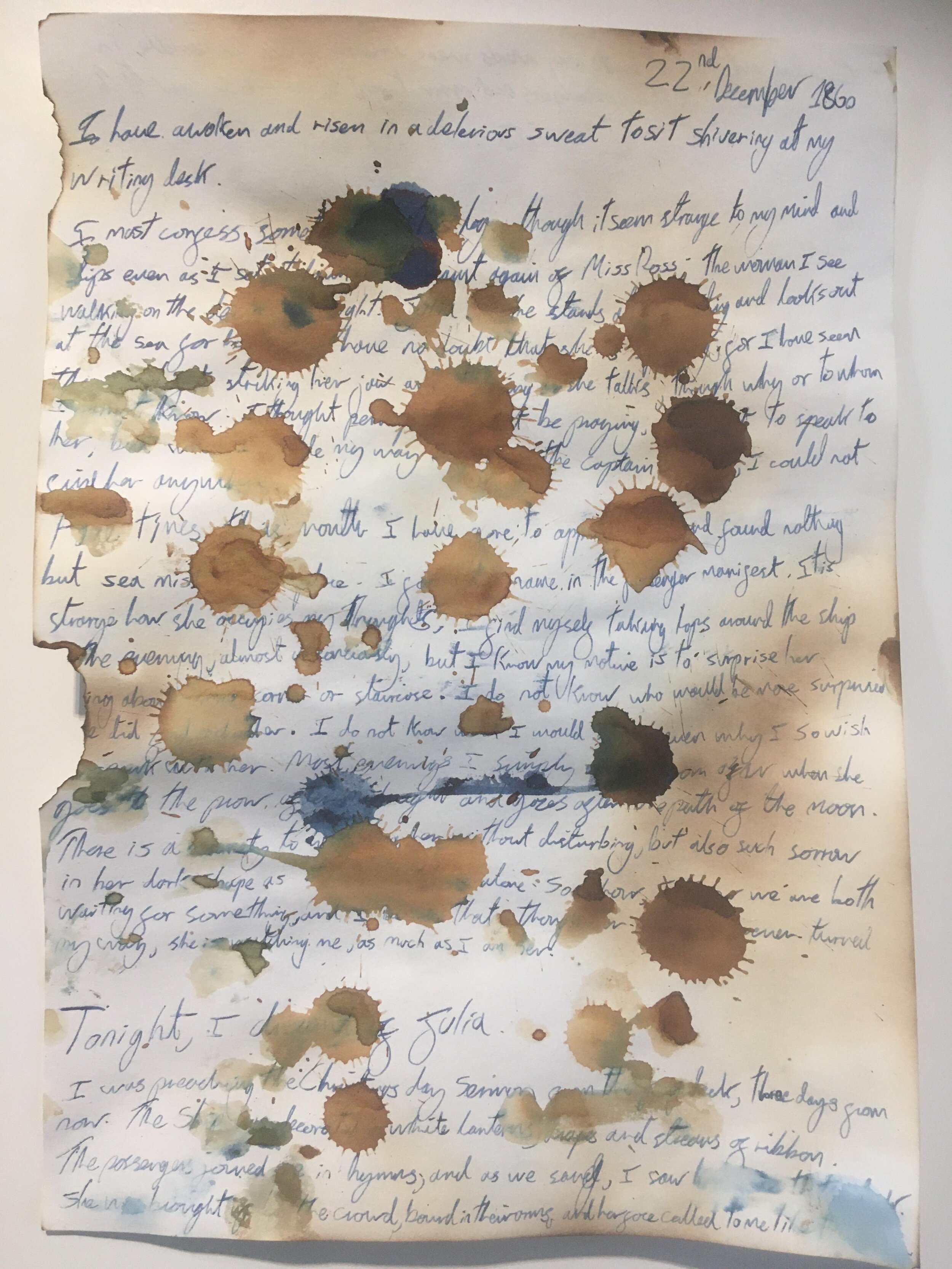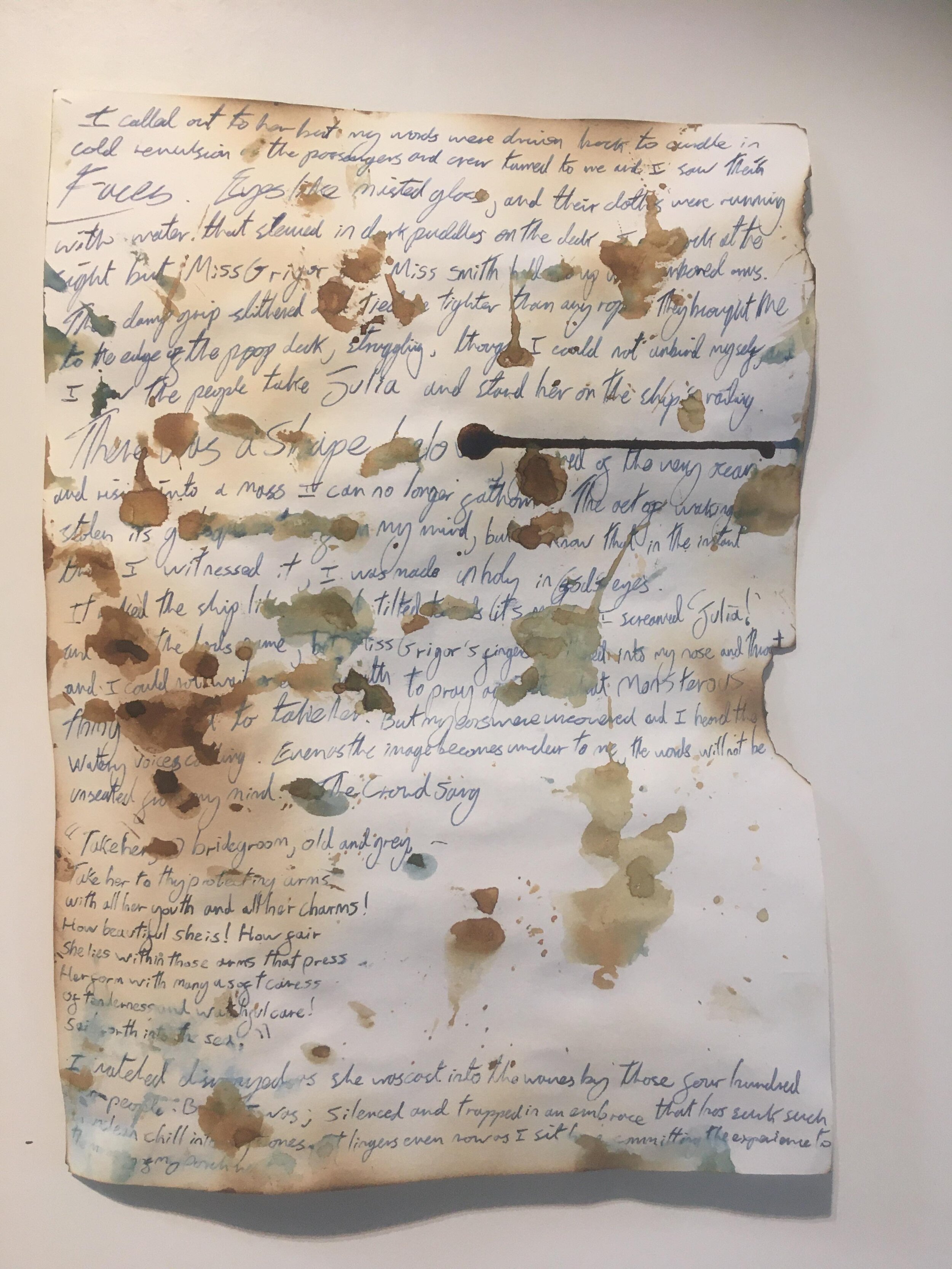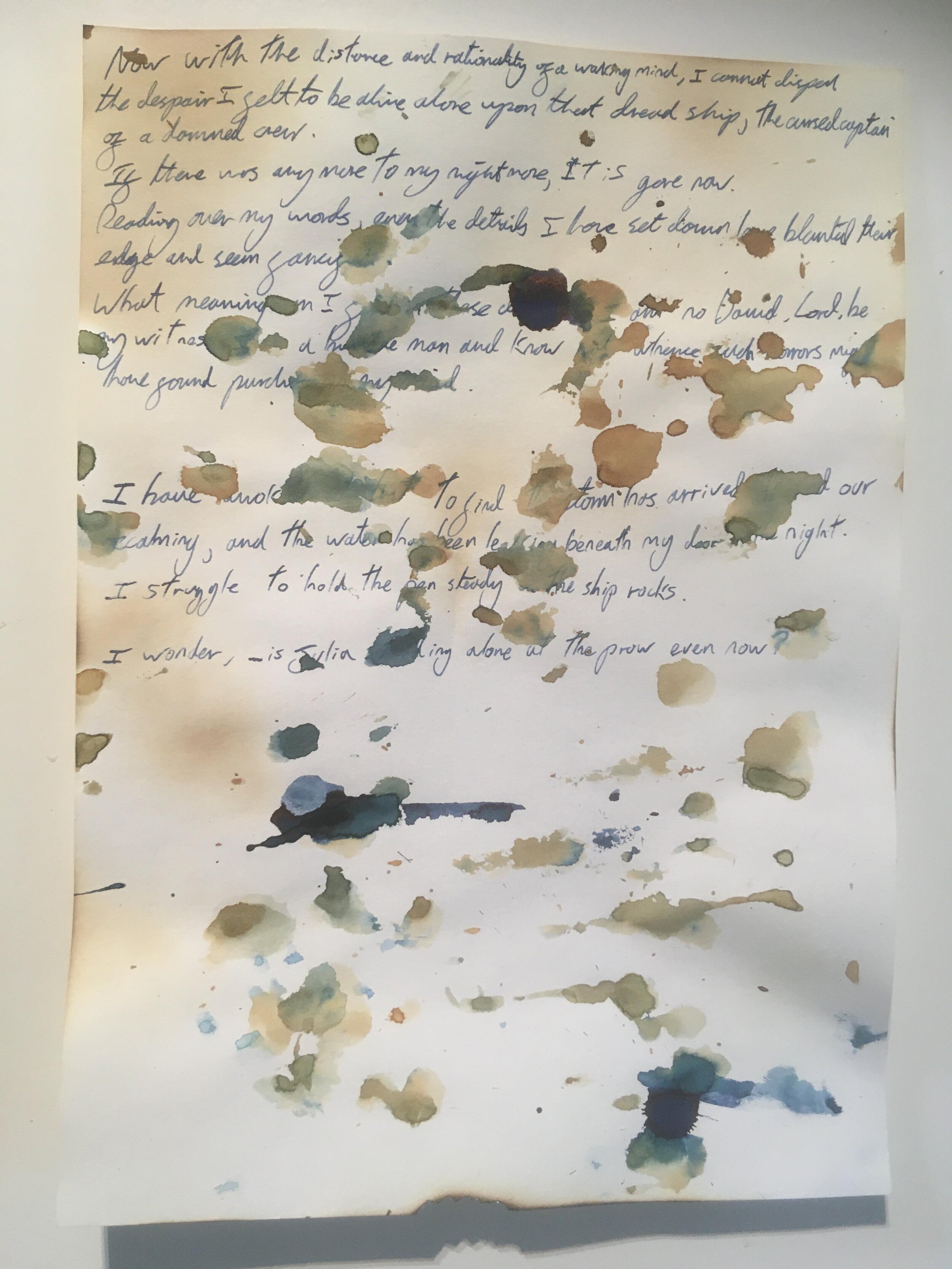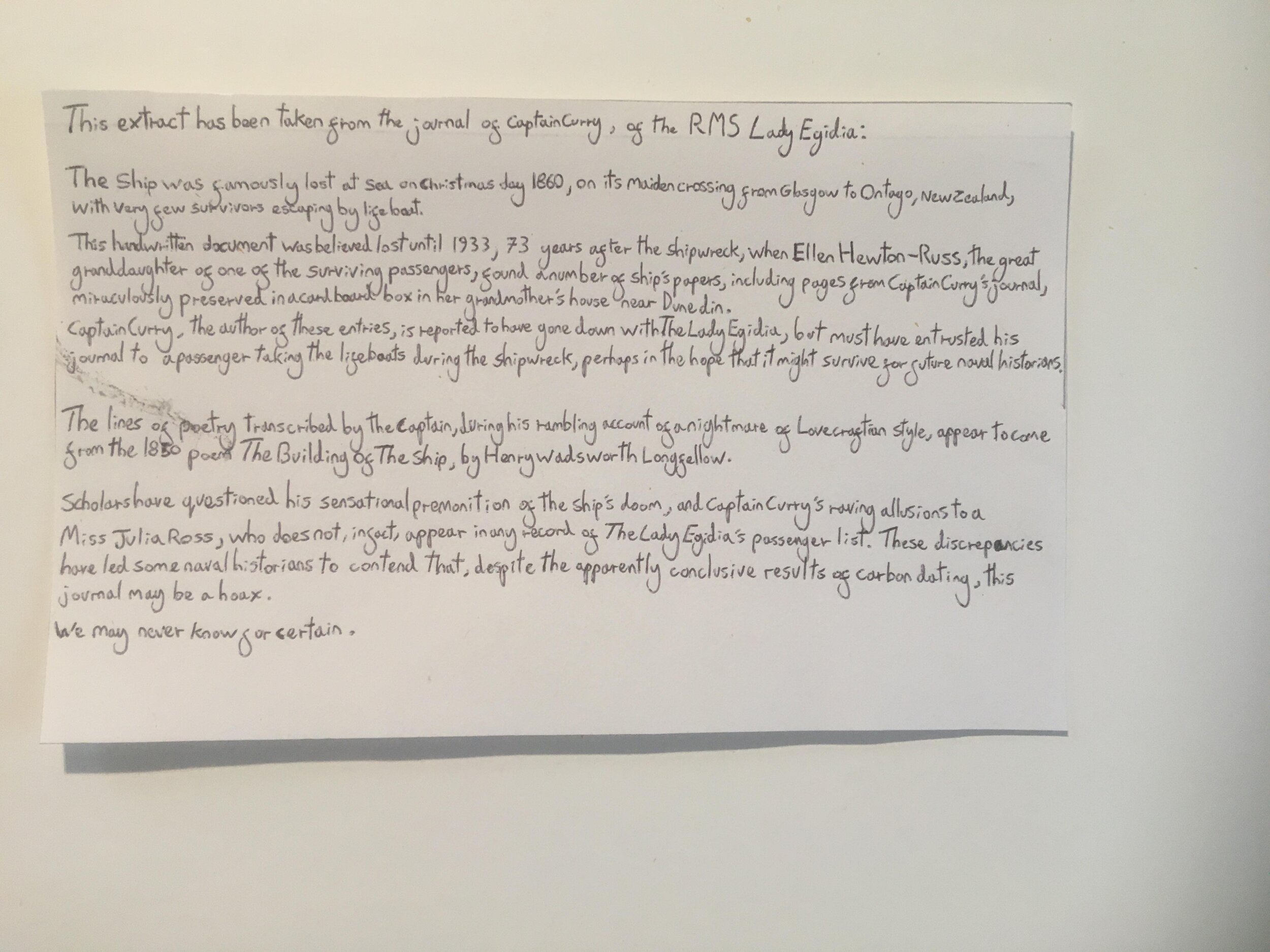Steren – Entry 11
22nd December 1860
The loss of Captain King still weighs upon me. Its suddenness and eerie nature might have caused concern amongst the passengers, if we had allowed the details to emerge; but two months of peace and progress have since passed with no incident and the crew are once again in good spirit. As always, I strive to be worthy of the position which has passed to me, and endeavour to live up to Captain King’s example of excellence in all things.
With some few setbacks, our maiden voyage goes steadily. We are now in the 71st day of our crossing. I do not expect that we shall reach Otago any sooner than the 1st of February with the present weather and delays. This becalming and slacked sails, which began 7 days hence, has led to some frustration, but I commend the passengers for their persevering attitude. Rarely have I seen a group of emigrants take so uncannily to life on the ocean.
We are making ready for the Lady Egidia’s first Christmas at sea. I have every hope that it shall be a merry occasion. I have made notes for a sermon, with the aid of Miss Smith and Miss Grigor, to whom I am ceaselessly grateful for their constant kindness and attention. I will deliver the word of the Lord on the poop deck, and I have asked Mr Grumlow to prepare a special meal for the passengers and crew. I am excited to see what he will make of the ration of treats we have kept preserved for this occasion. Mrs Justice is heavily pregnant and close to her time. Some have speculated over the child’s arrival on Christmas day, which would be another great source of joy for the occasion. Regardless of the date, it will be a joy to usher in another new life aboard this vessel. I think It is something we all need after losing so many children to diarrhoea over the last two months. Miss King has promised that she will be in attendance on deck for the celebrations, though it be the first time since October. I pray that joining in our communion may prove a balm for her grief. I wonder if I shall see Miss Julia Ross in the congregation. Perhaps it is too much to wish, though I find my eyes ever seeking her features in the crowd.
---
22nd December 1860
I have awoken and risen in a delirious sweat to sit shivering at my writing desk.
I must confess something to this log, though it seem strange to my mind and slips even as I set it down.
I dreamt again of Miss Ross. The woman I see walking on the deck every night. Julia. She stands at the railing at looks at the sea for hours. I have no doubt that she is speaking, for I have seen the moonlight striking her jaw and fluttering as she talks, though why or to whom I cannot know. I thought perhaps she might be praying and went to speak to her but when I came down from the cabin, I could not find her anywhere. Five times this month I have gone to approach her and found nothing but sea mist in her place. I found her name in the passenger manifest. It is strange how she occupies my thoughts. I find myself taking laps around the ship in the evening almost unconsciously, but I know my motive is to surprise her coming about some corner or staircase. I do not know in truth who would be more surprised if we did find each other. I do not know what I would say, or even why I so wish to speak with her. At times I simply watch from afar when she goes to the prow after midnight and gazes after the path of the moon. There is a serenity in watching without disturbing but also such sorrow in her dark shape as it hangs out there alone. Somehow, I know we are both waiting for something, and I believe that, although her eyes have never turned my way, she is as watching me, as much as I am her.
Tonight, I dreamt of Julia. I was preaching the Christmas day sermon from the poop deck, three days from now. The ship was decorated in white lanterns, drames and streaming ribbons. The passengers joined me in hymns, and as we sang, I saw her rise to the deck. She was brought up by the crowd, bound in their arms, and her face called me like the moon. I called out to her, but my words were driven back to curdle in cold revulsion as the passengers and crew turned to me, and I saw their faces. Their eyes were like misted glass, and their clothes were running with water that slewed in dark puddles on the deck. I fell back at the sight, but Miss Grigor and Miss Smith held me up with unboned arms. Their damp grip slithered and tied me stronger than any rope. They brought me to the edge of the poop deck, struggling, though I could not unbind myself, and I saw the people take Julia and stand her upon the ship’s railing. There was a shape below, formed of the ocean and rising into a mass that I cannot fathom now. The act of waking has stolen its grotesque nature from my mind, but I know that in the instant that I witnessed it, I was made unholy in G od’s eyes. It rocked the ship like a bowl tilted towards its open maw. I screamed, ‘Julia!’ and cried the Lord’s name, but Miss Grigor’s fingers slithered into my nose and throat and I could not wail or breath even to pray against what monstrous thing was set to take her. But my ears were uncovered, and I heard the watery voices calling. Even as the image becomes unclear to me the words will not be unseated from my mind. The crowd sang.
“Take her, O bridegroom, old and grey,
Take her to thy protecting arms
With all her youth and all her charms!
How beautiful she is! How fair
She lies within those arms that press
Her form with many a soft caress
Of tenderness and watchful care!
Sail forth into the sea.”
I watched dismayed, as she was cast into the waves by those four hundred undisguised mer-people. Bound I was; silenced and trapped in an embrace that has sunk such an unclean chill into my bones, it lingers even now as I sit here committing the experience to the memory of my parchment, with the distance and rationality of a waking mind. I cannot dispel the despair I felt to be alive alone upon a dread ship, the cursed captain of a damned crew. If there was any more to my nightmare, it is lost now. Reading over my words, even the details I have set down have blunted their edge and seem fanciful. What meaning can I find in these dreams. I am no David. Lord as witness I am a humble man and know not whence such horrors might have found purchase in my mind.
I have awoken to find the storm at last has come to end our becalming, and the water has been leaking beneath my door in the night. I struggle to hold my pen steady as the ship rocks. I wonder, is Julia standing at the prow even now?
---
This extract has been taken from the journal of Captain Curry, of the RMS Lady Egidia.
The ship was famously lost at sea on Christmas Day 1860 on its maiden crossing from Glasgow to Otago, New Zealand. The last transmissions from the ship’s radio
This handwritten document was believed lost until 73 years after the shipwreck, when Ellen Hewton-Russ, the great granddaughter of one of the surviving passengers, found a number of the ship’s papers, including pages from the captain’s journal, miraculously preserved in a box in her grandmother’s house near Dunedin. Captain Curry, the author of the journal entries, went down with The Lady Egidia, but must have entrusted his journal to a passenger during the shipwreck, so that it might survive for posterity and future naval historians to read.
The lines of poetry transcribed by the captain, during his rambling account of a nightmare of Lovecraftian style, appear to come from the 1850 poem The Building of The Ship, by Henry Wadsworth Longfellow. Scholars have wondered at this premonition of the ship’s doom, and Captain Curry’s allusions to a Miss Julia Ross, who does not in fact appear in any record of the Lady Egidia’s passenger list. These discrepancies have led some naval historians to contend that despite the apparently conclusive results of carbon dating, the journal may be a work of fiction, or an intentional hoax.
by Jasper Evans

